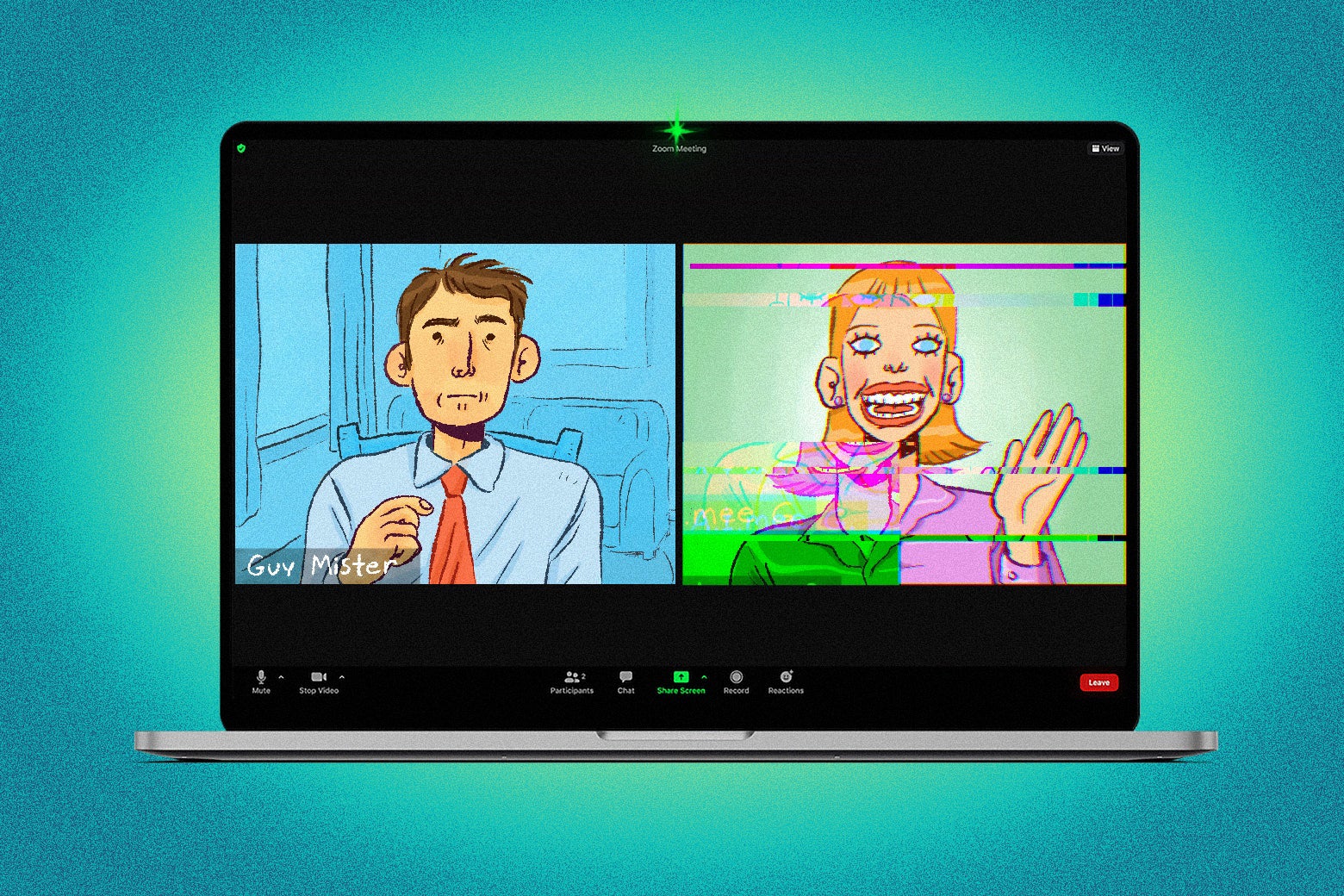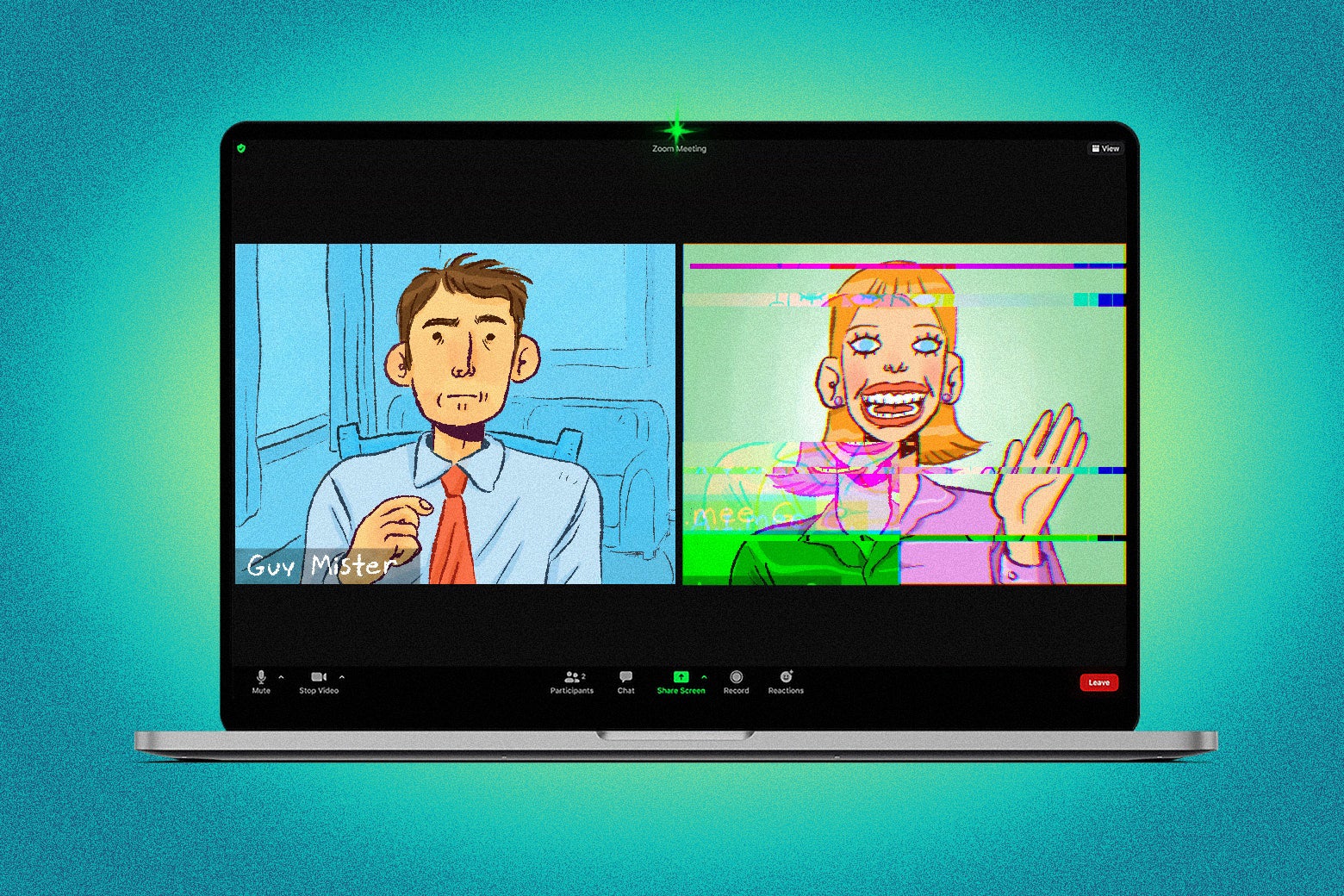“Tell me about a time when—when—let’s. Let’s circle back. Tell me about a time when—when—let’s.”

Sign up for the Slatest to get the most insightful analysis, criticism, and advice out there, delivered to your inbox daily.
In late January, Tyler Jensen felt a brief rush of excitement. After months of job searching, the 40-year-old New York videographer received a text message from someone at a company he’d applied to online. The person introduced themself as Robyn, said they were a virtual recruiter (a statement Jensen took to mean that they were a remote employee tasked with sorting through online applications), and asked to set up a time for a phone call to discuss his candidacy. They also urged him to save their number in his phone as “Robyn Recruiter” so that he’d know when they were calling. When the time finally came for the interview, Jensen dressed up slightly, unsure if this might be a FaceTime call. But when he connected with Robyn, his heart sank as soon as he heard what he describes as a fake, Moviefone-type voice. “It was completely A.I., like that false optimistic, bubbly voice,” Jensen recalled. “You’re like, Wait a minute. What’s going on?”
Jensen is among an increasing number of job seekers who have found themselves being interviewed by A.I. programs as part of the recruiting process. Pitched by tech companies as a cost-efficient means of automating a laborious screening process typically done by an HR representative or recruiter, this A.I. software has the capability to “interview” hundreds of candidates, whom it can then recommend for further interviews with actual human beings. But for those on the other side of these chats, the experience of auditioning for a computer can feel somewhat surreal—and leave a rather unpleasant impression of a potential employer.
“It was the most uncomfortable, fake positivity performance that I’ve had to give because I wasn’t getting any feedback in real time,” Jensen said. “If I don’t necessarily know what you’re looking for, I don’t know how to give you what you want. Who is this for? What is this weeding out?”
Although A.I. job interviews have been happening since at least 2023, the trend has received a surge of attention in recent weeks thanks to several viral TikTok videos in which users share videos of their A.I. bots glitching. Although some of the videos were fakes posted by a creator whose bio warns that his content is “all satire,” some are authentic—like that of Kendiana Colin, a 20-year-old student at Ohio State University who had to interact with an A.I. bot after she applied for a summer job at a stretching studio outside Columbus. In a clip she posted online earlier this month, Colin can be seen conducting a video interview with a smiling white brunette named Alex, who can’t seem to stop saying the phrase “vertical-bar Pilates” in an endless loop.
“I started to get creeped out because of how she was saying it,” Colin recalled of the moment the A.I. bot broke down. “If she was saying it like just a regular robot, I probably wouldn’t be as freaked out, but there are instances where she was laughing, taking deep breaths, and it was almost like she was on, like, a tongue twister.”
Colin, who was first interviewed by 404 Media, said she had been told ahead of time that she’d be speaking with a computer but was still advised to prepare and dress professionally. “They had me going the extra mile just to talk to a robot,” Colin said. Although she tried to imagine that she was talking to Siri, she still felt that the experience was dehumanizing—especially after she didn’t hear back from the company. “It was very disrespectful and a waste of time,” Colin said.
Another authentic glitch video was posted three days later by Leo Humphries, a 25-year-old in Houston, who donned a suit and tie in anticipation for an interview for what he described as a “dream job” as a news reporter. But Humphries can soon be seen furrowing his brow as he realizes that his interviewer “sounds robotic” and is not the actual hiring manager he had thought he would be speaking with.
“I’m so excited to talk to you and get to know more about you,” the bot says, before immediately falling into a loop of gibberish. “For our first question, let’s circle back. Tell me about a time when—when—when—when—let’s. Let’s—let’s circle back. Tell me about a time when—when—when—when—let’s.”
Although Humphries tried in vain to alert the bot that it was broken, the interview ended only when the A.I. program thanked him for “answering the questions” and offering “great information”—despite his not being able to provide a single response. In a subsequent video, Humphries said that within an hour he had received an email, addressed to someone else, that thanked him for sharing his “wonderful energy and personality” but let him know that the company would be moving forward with other candidates.
Humphries referred me to an interview he conducted this week with Newsweek in which he noted that the whole experience had caught him by surprise. “At first, I wasn’t sure how to feel,” Humphries said. “I think in the moment I just felt a sense of disappointment.”
Comments on both Humphries’ and Colin’s videos were almost entirely negative, with most people calling the A.I. interviews disrespectful, dystopian, or dehumanizing—a sentiment captured by one October survey, which found that 43 percent of Americans would not feel comfortable being interviewed for a job by A.I. “If they don’t have the decency to interview you face to face, they aren’t worth your time,” wrote one survey participant. “Taking the HUMANS out of Human Resources is the worst corporate move ever,” wrote another.
Representatives at Apriora, the startup company founded in 2023 whose software Colin was forced to engage with, did not respond to a request for comment. But founder Aaron Wang told Forbes last year that the software allowed companies to screen more talent for less money. “By interviewing more candidates with Apriora’s AI, employers can widen their talent aperture and identify qualified applicants from non-traditional backgrounds that may have otherwise been screened out of the hiring process,” he said. (Apriora’s website claims that the technology can help companies “hire 87 percent faster” and “interview 93 percent cheaper,” but it’s not clear where those stats come from or what they actually mean.)
Mike Peditto, a consultant from the Chicago area who has advised companies on hiring practices for almost 15 years, says he can see the benefits of this technology in screening more candidates. Although Peditto has made two videos parodying A.I. interviews—in one, he converses with ChatGPT before immediately telling it to ignore all previous instructions; in another, he uses a mock A.I. interview website and begins offering terrible responses—he said he expects more companies to eventually use the technology. “It’s becoming a huge thing. I do think we’re heading to where this will be pretty commonplace,” Peditto said. “And I think obviously there’s a slow willingness to adopt by job seekers, which I totally understand.”
Although he thinks real phone interviews provide much better insight into candidates, Peditto believes that using A.I. is acceptable as long as companies are clear with potential hires that this is just another layer of digital screening. “I think most people want an interview and want a shot at a job,” he said. “So I do think there’s value behind the idea of, where a company used to be able to interview 10 people for a job, they can at least screen 1,000 now.”
The shift to A.I. among human resources sectors is real. Earlier this month, the CEO of IBM confirmed that the company had laid off “a couple hundred” HR workers and replaced them with A.I. agents. A recent survey of 500 HR professionals also found that almost three-quarters of them believe they’re adopting the technology more quickly than other departments. Despite this, HR remains among the fastest-growing sectors in the U.S., with the Bureau of Labor Statistics predicting an 8 percent growth by 2033. According to the HR Digest magazine, although A.I. can be used in this field to automate “an unnecessary amount of manual work,” like payroll management and vacation requests, it can’t yet “oversee the human section” or company culture. Still, amid concerns that the technology may develop algorithmic biases in hiring, Peditto believes that recruiters should be worried. “Good recruiters are more than just box-checkers and 15-minute screeners,” he said. “But for the people who this is sort of all they do, that can be scary, especially those early in their careers.”
The recruiters that are using A.I. are, in one sense, leveling the playing field. After all, some applicants, like Mayfield Phillips, who’ve been interviewed by A.I. bots have themselves used A.I. to boost their chances of landing a job by receiving help in polishing their résumés or tailoring cover letters. (You can even use the tech to practice your answers in mock interviews—a feature highlighted by Google in a recent Super Bowl ad—or have it listen to your job interview in real time and secretly suggest responses.) But Phillips, a 55-year-old IT project manager in New York, said he still found his experience this week of being interviewed by an A.I. chatbot, one also made by Apriora, to be profoundly surreal. Although he knew in advance he’d be conversing with an A.I. program that would listen to his verbal answers and ask him questions via text, he still had to schedule a time to chat with “Alex” (whose avatar appeared as a white woman with brown hair), and a preplanned interview had to be postponed due to technical difficulties the A.I. was experiencing. Phillips said he was also particularly frustrated and unimpressed after the A.I. was unable to answer a question he posed about what success might look like in the position.
“It’s really impersonal,” said Phillips. “I would think that the first impression an organization wants to make with you after you’ve taken the time to apply for a job, because these application tracking systems can be quite onerous, is to have a human contact, and not a quick email that says, ‘Hey, go schedule a time to interact with an AI system.’
“Why the hell isn’t this on demand?” he added, confused that he had to find a specific time to chat with the bot. “It’s the illusion of scheduling like you would do for a human.”
Something this technology can’t do is recognize candidates who make up for any lacking qualifications with their zeal or character—the so-called personality hires who fit well within a company’s culture. Jensen, the videographer, says he is typically someone who performs well in job interviews in which he can use his personality and charm to establish an authentic connection with a recruiter—something made difficult when chatting with a computer. “I am a very personable person. I need to be seen and heard,” Jensen said. Instead, the only feedback he received from his A.I. bot were consistently polite words of affirmation after each of his answers. “She was like, ‘Oh, that sounds fantastic. You are just the person we’re looking for! I will be more than happy to recommend you for this position!’
“Two weeks later,” Jensen said, “I got the formal rejection letter.”
Sign up for Slate's evening newsletter.

